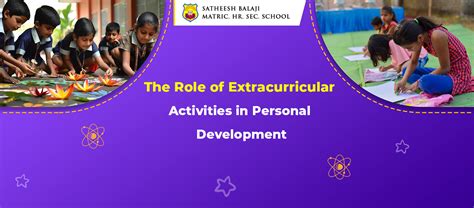The Role of Extracurricular Activities in Developing Skills for the Future

In today’s rapidly changing world, success is no longer solely defined by academic achievement. While strong grades and technical expertise are undeniably important, there is a growing recognition that well-rounded individuals possess a broader skill set. This skill set goes beyond the classroom and includes a wide range of attributes that can be nurtured through extracurricular activities. Whether it's through sports, clubs, volunteering, or creative pursuits, extracurricular activities play a pivotal role in developing essential skills for the future.
Enhancing Soft Skills
One of the most significant benefits of extracurricular activities is the development of soft skills—personal attributes that enable someone to interact effectively with others. These skills are increasingly important in the modern workforce, where collaboration, leadership, and emotional intelligence are highly valued. Here’s how extracurriculars contribute to these qualities:
Communication Skills
Whether you’re presenting a project in a school debate club, writing for a student newspaper, or acting in a theater production, extracurricular activities give students opportunities to express themselves clearly and persuasively. These activities help individuals learn how to communicate with different audiences, hone their listening skills, and develop a confident speaking voice.
Leadership and Teamwork
From captaining a sports team to organizing a charity event, extracurricular activities teach the importance of both leadership and teamwork. Students learn how to take initiative, make decisions, and motivate others. At the same time, they understand the value of collaboration, learning how to contribute effectively to a group and respect different perspectives. These are all key attributes for leadership roles in the workplace.
Time Management and Organization
Balancing schoolwork with extracurricular commitments requires careful time management. Students who participate in activities like music, sports, or volunteering often develop strong organizational skills as they juggle multiple responsibilities. The ability to prioritize tasks and meet deadlines is a critical skill that benefits individuals in both academic and professional settings.
Problem-Solving and Critical Thinking
Many extracurricular activities, such as robotics clubs, debate teams, or science fairs, require participants to solve complex problems. These activities challenge students to think critically, approach issues from different angles, and develop innovative solutions. Such problem-solving skills are highly transferable and valued across a range of industries, especially in fields like technology, engineering, and business.
Building Confidence and Resilience
Extracurricular activities provide a platform for students to step outside their comfort zones and try new things. Successes and failures within these activities build self-confidence and resilience—traits that are crucial for thriving in the face of future challenges.
Overcoming Setbacks
Whether it's a losing game, a failed audition, or a difficult project, extracurriculars teach students how to deal with setbacks constructively. Learning how to persevere through failure and keep pushing toward a goal fosters resilience. These experiences equip young people with the mental toughness needed to handle the ups and downs of life and work.
Building Self-Esteem
Accomplishments in extracurricular activities, whether they are winning a competition, mastering a new skill, or contributing to a successful event, can significantly boost a student’s self-esteem. This sense of achievement helps students believe in their own potential, which can be crucial for career success and personal growth later in life.
Developing Specialized Skills and Interests
Extracurricular activities often allow students to explore fields and interests that go beyond their academic curriculum. For example, students who join a coding club or a theater troupe develop highly specialized skills that can benefit them in their future careers. This exploration of different domains also helps students discover their passions and refine their personal and professional goals.
Technical and Creative Skills
In an increasingly specialized world, technical skills are a major asset. Activities like coding clubs, robotics teams, and graphic design workshops provide students with hands-on experience that can give them an edge in fields like technology, engineering, and digital media. At the same time, creative activities such as painting, photography, or drama foster innovation and creative problem-solving, qualities valued in sectors like marketing, design, and entrepreneurship.
Entrepreneurial Mindset
Extracurricular activities such as starting a student-run business, organizing events, or working on social impact projects can cultivate an entrepreneurial mindset. Students learn how to identify opportunities, take calculated risks, and think creatively to solve problems. These skills are indispensable for future careers, especially in fast-moving industries or for those interested in starting their own ventures.
Preparing for Career Success
The skills developed through extracurricular activities are not just beneficial in school—they are directly applicable to the workplace. Many employers value a candidate’s extracurricular involvement because it reflects a well-rounded individual who can contribute to a team, manage multiple tasks, and adapt to changing circumstances.
Networking and Professional Connections
Extracurricular activities can provide students with opportunities to network and build relationships with mentors, peers, and professionals. For example, volunteering for a nonprofit organization can connect students with industry leaders, while joining professional associations or student clubs can introduce them to future colleagues or employers. These networks can be instrumental in securing internships and job opportunities later on.
Demonstrating Initiative and Passion
Employers look for individuals who demonstrate initiative and passion, both of which can be cultivated through extracurriculars. By taking on leadership roles or dedicating time to causes that matter to them, students show employers that they are proactive, dedicated, and have a strong work ethic—qualities that set them apart in the competitive job market.
Diverse Interests and Adaptability
In the modern job market, adaptability is key. Extracurricular activities expose students to a range of experiences and challenges, preparing them to adapt to diverse situations. Whether it’s learning to balance multiple projects, collaborating with people from different backgrounds, or adjusting to unexpected changes, extracurriculars teach flexibility and versatility—traits that are invaluable in a fast-evolving workforce.